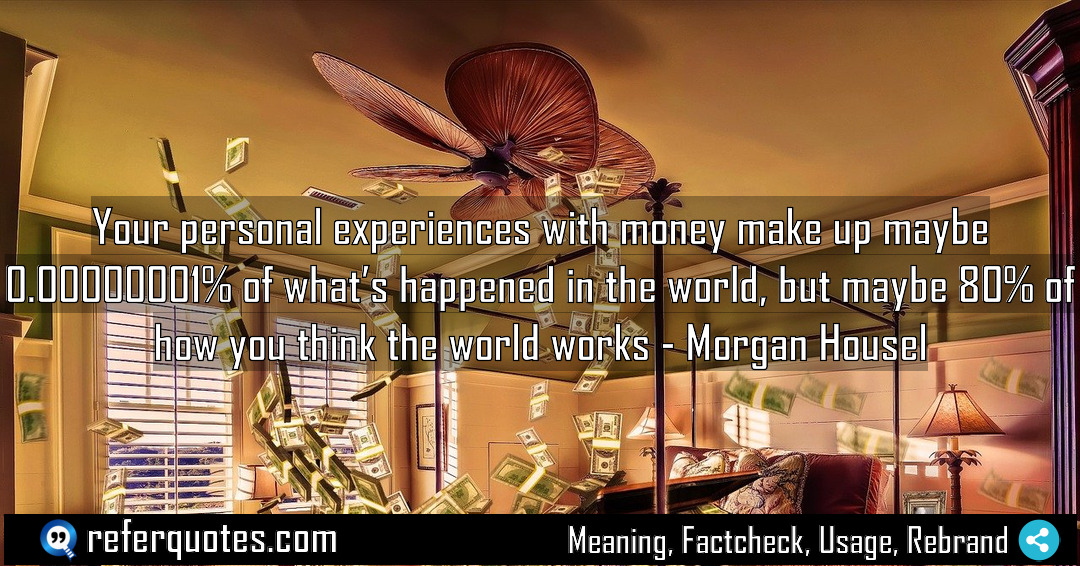
Understanding Morgan Housel’s Quote on Personal Finance
Your personal experiences with money make up a tiny fraction of reality, yet they dominate your financial worldview. It’s the invisible script running all your money decisions, often without you even realizing it.
Share Image Quote:
Table of Contents
Meaning
This quote perfectly captures the idea that our financial beliefs aren’t based on objective data, but are overwhelmingly shaped by our own unique, and very limited, life experiences.
Explanation
Let me break this down for you. We all walk around thinking we have a pretty rational handle on how money and the economy work. But the truth is, our brains are hardwired to give enormous weight to what we’ve personally lived through. That one big recession you experienced, that bull market that made you feel like a genius, the financial habits you saw in your parents’ house—these events are statistically insignificant in the grand scheme of global financial history. A blip. A rounding error. But to your psyche? They’re everything. They form this powerful, emotional narrative that becomes your default setting for interpreting every new financial event. It’s why two people can look at the exact same stock chart and see two completely different stories—one sees risk, the other sees opportunity. Their data is the same, but their personal “money story” is completely different.
Quote Summary
Reading Level60
Aesthetic Score70
Origin & Factcheck
This is a direct quote from Morgan Housel’s fantastic 2020 book, The Psychology of Money. It’s a modern classic for a reason. You sometimes see it floating around social media unattributed, but it’s 100% his original insight from the book.
Attribution Summary
Where is this quotation located?
| Quotation | Your personal experiences with money make up maybe 0.00000001% of what’s happened in the world, but maybe 80% of how you think the world works |
| Book Details | Publication Year: 2020; ISBN-10: 0857197681; ISBN-13: 978-0857197689; Pages: 256 (approx.) |
| Where is it? | Unknown chapter / page |
Context
Housel uses this idea in the book to explain why smart people can have such wildly different, and sometimes disastrous, opinions on debt, risk, and investing. He’s making the case that financial outcomes are less about what you know from a textbook and more about the behavior driven by your personal history. It’s the foundation for understanding why there’s no one “right” way to handle money that works for everyone.
Usage Examples
You can use this concept in so many ways. When you’re mentoring a junior employee who’s terrified of the stock market because they graduated into the 2008 crisis, explain this quote to them. It helps them see their fear isn’t about math, it’s about a story they’re telling themselves. Use it in team meetings to foster empathy—to explain why the sales team might be gung-ho about risk while the operations team is cautious. It’s not that one is right and one is wrong; they’ve just lived different financial lives. Honestly, I use it as a personal mantra. It reminds me to question my own gut reactions. Is this a smart move, or does it just feel smart based on my own limited past?
To whom it appeals?
Share This Quote Image & Motivate
Motivation Score50
Popularity Score70
Shareability Score65
FAQ
Question: So, is personal experience with money bad?
Answer: Not at all! It’s incredibly powerful. The danger is in not recognizing its disproportionate influence. The goal is to be aware of your own lens so you can compensate for its biases.
Question: How can I overcome this bias?
Answer: You don’t “overcome” it so much as you manage it. Actively seek out stories and data that contradict your own experience. Read financial history. Talk to people from different generations and backgrounds. It’s about broadening your dataset.
Question: Does this only apply to money?
Answer: Great question. While Housel applies it to finance, the principle is universal. It applies to how we think about politics, relationships, career risk—you name it. Our personal stories shape our worldview in every area.
Similar Quotes
You know, that idea that “Money is multiplied in practical value depending on the number of W’s…” it’s not just about cash. It’s about designing a life where your time…
“It’s not how much money you make…” This single sentence from Kiyosaki flips the entire script on what we’re taught about wealth. Table of Contents Meaning Explanation Origin & Factcheck…
Few things matter more with money than understanding your own time horizon. It’s about knowing the game you’re playing and not getting distracted by the noise from other people’s completely…
You can be wrong half the time and still build incredible wealth. It’s a liberating idea that shifts the focus from being right all the time to being right enough…
“Money comes and goes,” but the real game-changer is understanding its mechanics. That knowledge is what gives you the power to build lasting wealth, not just chase paychecks. Table of…
